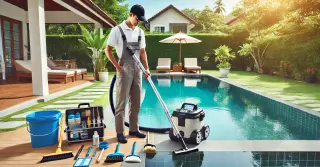Residential Pool Maintenance Elizabeth NJ

Proper residential pool maintenance starts with regular cleaning and debris removal. Keeping your pool free from dirt, leaves, and other debris is essential for both aesthetics and health.
- Skimming Debris and Vacuuming Dirt: Regular skimming and vacuuming are vital tasks for maintaining a clean pool. Use a skimmer to remove floating debris such as leaves and bugs, and vacuum the pool’s floor to remove dirt and sediment. This keeps the water clear and inhibits algae and bacteria.
- Cleaning Pool Walls and Tiles: Don't forget to clean the pool walls and tiles regularly. Brushing the walls and scrubbing the tiles prevents algae, calcium, and residue buildup. Use a brush designed for your pool's surface, be it plaster, fiberglass, or vinyl, to ensure safety. Routine cleaning keeps your pool pristine and extends its lifespan.
Ensuring Proper Water ChemistryBalancing the water chemistry is crucial for the safety and comfort of swimmers. Correct chemical levels prevent algae, bacteria, and other contaminants, while also protecting your pool's structure and equipment.
- Testing and Adjusting Chemical Levels: Consistently test your pool water to track chemical levels, including pH, chlorine, alkalinity, and calcium hardness. Use a high-quality pool test kit to ensure precise readings. Make adjustments as required to ensure balanced water. Balanced water prevents corrosion, scaling, and cloudiness, providing a safe and enjoyable swim.
- Using Pool Chemicals Safely: When handling pool chemicals, always follow the manufacturer's instructions and use appropriate safety gear, such as gloves and safety glasses. Add chemicals in the right order, and do not mix them directly, as this can cause dangerous reactions. Keep chemicals in a cool, dry area, out of reach of children and pets. Safe chemical use ensures safety for all and maintains water quality.
Regular Equipment Inspections and MaintenanceConsistent inspection and maintenance of pool equipment are crucial for efficient pool operation. This includes pumps, filters, heaters, and chlorinators, which all play key roles in maintaining a clean and functional pool.
- Checking and Cleaning the Pool Pump and Filter: Regularly check your pool pump and filter to ensure they are functioning correctly. Clean or replace filter cartridges as needed to maintain good filtration. A well-functioning pump and filter keep the water clear and free of contaminants, reducing the workload on your chemical treatments.
- Maintaining Heaters and Chlorinators: Ensure your pool heater and chlorinator are operating efficiently. Check for signs of wear and tear, like leaks, corrosion, or malfunctioning parts. Routine maintenance and prompt repairs can avoid costly repairs and increase the lifespan of your equipment. An efficient heater guarantees warm and comfortable water, while a functional chlorinator maintains clean and sanitized water.
Residential pool maintenance involves regular cleaning, balanced water chemistry, and equipment maintenance. By following these guidelines, you can maintain a safe, clean, and enjoyable pool throughout the swimming season.




